|
|
本帖最后由 I'm_zhcn 于 2009-3-12 00:04 编辑
Chinese Buck Trend of Economic Negativity
http://www.gallup.com/poll/115318/Chinese-Buck-Trend-Economic-Negativity.aspx
February 20, 2009 by Cynthia English
More economic pessimism in Indonesia, South Korea, and Japan
WASHINGTON,D.C. -- U.S. Secretary of State Hillary Clinton heads to China Fridayfor the last leg of a four-country tour of Asia that has included majordiscussions on the global economic crisis. Gallup Polls conductedthroughout 2008 reveal that the Chinese are more optimistic about theireconomy than the other three nations she visited.
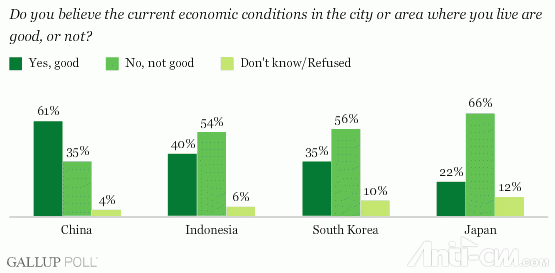
With a real GDP growth of 6.8% in 2008, China appears to have fared slightly better than other large Asian economies;however, Beijing officials recently stated that 2009 could be the worstyear for China's economy this decade. According to a recent Gallup Pollof China, conducted from September to November 2008, Chineserespondents show continued positivity about their own city's economydespite this slowdown in growth, which perhaps has yet to have asignificant effect on the local economy there.
While Gallup did not collect data on residents' perceptions ofeconomic conditions in the country as a whole, respondents' views ofconditions in their local area have remained fairly consistent andpositive since 2006. A majority of Chinese respondents still sayeconomic conditions in the city or area where they live are good.
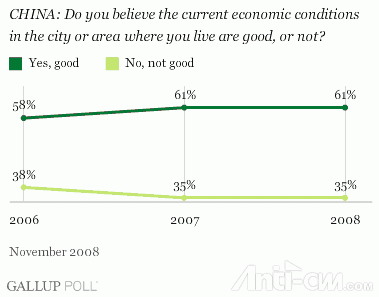
Chinese respondents also remain optimistic about the momentumsurrounding economic conditions in their local area. Since 2006, atleast 8 in 10 have said they think economic conditions in the city orarea where they live are getting better.
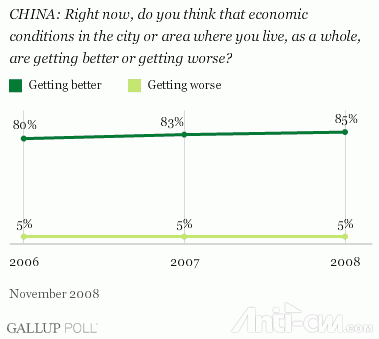
The Chinese data stand in clear contrast to findings from the otherthree countries Clinton visited. In a September 2008 Gallup Poll ofSouth Korea, only 13% of Koreans said economic conditions in theircountry were good and roughly 6 in 10 respondents (62%) said conditionsare getting worse.
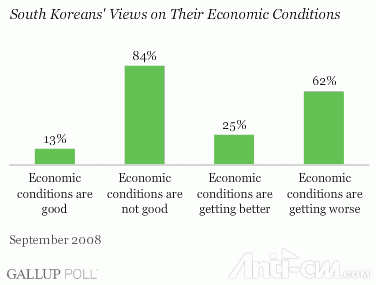
One key topic on the agenda for Clinton in South Korea is the open issue of the Korea-U.S. Free Trade Agreement.While the Obama administration sees the agreement as "flawed" and inneed of revision, Seoul does not believe revisions are warranted.However, Gallup data from 2007 show opinions of the benefits of thistrade agreement were mixed among the Korean people who remain veryconcerned about the overall economic environment in their country today.
In Indonesia, where Clinton visited Wednesday, 72% of respondentssaid their national economy is not good and more than half (57%) saidit is getting worse in a Gallup Poll conducted in March 2008. Thesefigures are the highest economic negativity measured in Indonesia inyears, and Indonesians were expressing this sentiment even before theglobal financial slowdown turned into a meltdown.
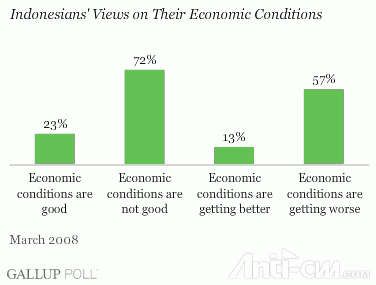
With national elections occurring in Indonesia in July,economic concerns are likely to play a key role during the campaignseason as more than half of Indonesians (55%) said they aredissatisfied with their personal standard of living and more than third(39%) said their standard of living is getting worse.
Clinton began her trip in Japan, which some economic experts argue has been harder hit by the economic crisisthan any other developed nation. A December 2008 Gallup Poll of Japanshows more than 90% of respondents think their national economy is bad(94%) and 90% say it is getting worse.
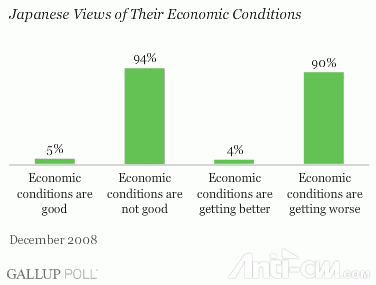
Speaking about the trip and her plans to meet with leaders fromChina, Japan, Indonesia, and South Korea, Clinton states she is"seeking greater cooperation about how together we're going to work ourway through these difficult economic times." Gallup Poll data suggestthe residents of these countries will welcome such efforts.
Survey Methods
Results from China are based on face-to-face interviews in 2006 and2007 and telephone and face-to-face interviews in 2008 withapproximately 3,730 in 2006, 4,238 adults in 2007, and 4,383 adults in2008, aged 15 and older, conducted in October 2006, October 2007, andNovember 2008 respectively. For results based on the total sample ofnational adults, one can say with 95% confidence that the maximummargin of sampling error is ±2.2 percentage points in 2006 and 2008 and±2.1 percentage points in 2007.
Results from Indonesia are based on face-to-face interviews andresults from Japan and South Korea are based on telephone interviewswith approximately 1,050 adults in Indonesia, 750 adults in Japan, and1,000 adults in South Korea, aged 15 and older, conducted in March 2008 in Indonesia, December 2008 in Japan, September 2008 in South Korea,respectively. For results based on the total sample of national adults,one can say with 95% confidence that the maximum margin of samplingerror is ±4.3 percentage points for Japan, ±3.5 percentage points forIndonesia, and ±3.8 percentage points for South Korea.
The margin of error reflects the influence of data weighting. Inaddition to sampling error, question wording and practical difficultiesin conducting surveys can introduce error or bias into the findings ofpublic opinion polls. |
Buck, Economic, Gallup, Negativity, Trend, Buck, Economic, Gallup, Negativity, Trend, Buck, Economic, Gallup, Negativity, Trend
评分
-
1
查看全部评分
-
|